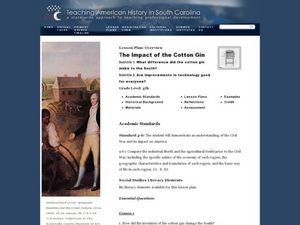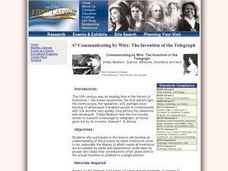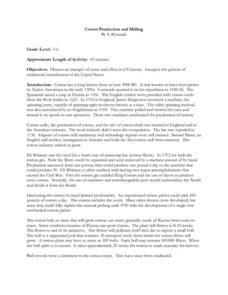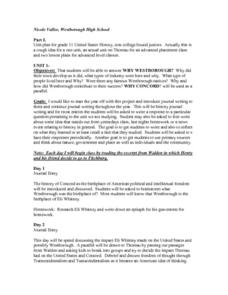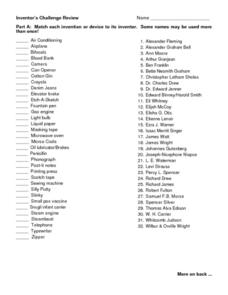DocsTeach
A Petition for the Cotton Gin
While almost forgotten today, the cotton gin could be seen as one of the causes of the Civil War. The innovation led to more cotton production, which in turn undermined political power balances in the 1800s. Individuals unpack the...
Curated OER
The Cotton Gin
Students are introduced to an early American inventor, Eli Whitney, and his experiences with the Patent Office. The economic importance of the cotton gin and its impact on slavery are also addressed.
Curated OER
Eli Whitney's Patent for the Cotton Gin
Students review the U.S. patent laws by researching Eli Whitney's petition for a renewal on his cotton gin patent. They examine documents to assess the impact of the cotton gin, role-play the patent hearing and discuss the effects of...
Curated OER
The Impact of the Cotton Gin
Fourth graders study Eli Whitney and the cotton gin. In this lesson on the cotton gin, 4th graders use primary and secondary sources to gather information about Eli Whitney, the cotton gin that he invented and how it changed the south.
National First Ladies' Library
Eli Whitney: A Top Ten Inventor?
Students conduct research and present their findings in a persuasive manner. Then they work in groups to enhance the development of cooperative work skills. Students also present their findings through persuasive skills in writing and/or...
Curated OER
Cotton Production and Milling
Students examine cotton production and milling. They compete in a hand-ginning contest to realize how difficult it was to separate the seeds from the fibers of cotton. They discuss why Eli Whitney's cotton gin was an important invention.
Curated OER
Early 19c Industrialization in America: The Market Revolution
Posing a question about the effects of American Industrialization, this presentation provides viewers with a comprehensive look at the 19th century. From the "Lowell Girls" to the Iron Horse, these slides would be an excellent supplement...
Curated OER
King Cotton
Sixth graders investigate the farming process for cotton and its impact on the United States history. In this cotton farming lesson, 6th graders read background information on the cotton farming process and discuss the role of slavery in...
Curated OER
Thoreau
Eleventh graders answer the question Why Westborough? Why did their town develop as it did, what types of industry were here and why. They are introduced to journal writing. Students free write about ideas that stand out from class. ...
Curated OER
Innovative Inventions
Help your scholars get a grasp on the chronology of the Industrial Revolution with this "Innovative Inventions" worksheet. They discover what year various items were invented, and then create a timeline placing each invention and...
Curated OER
Inventor's Challenge Review
In this science learning exercise, students match each invention or device to its inventor listed on the right. There are 32 inventors listed and some may be used twice. Then they order the items in each group from oldest to newest and...
Curated OER
Inventor's Challenge
For this science worksheet, students use reference materials to complete the information for each inventor, including invention created and their nationality. They also construct a time line to illustrate the development of technology...
Curated OER
JUST A MATTER OF TIME
Students recognize the dynamic changes in themselves and in agriculture that have occurred through the years. They are shown pictures of a baby or students are asked to think of their little brothers or sisters or themselves in...
Curated OER
The Pre-Civil War Era (1815–1850)
For this online interactive U.S. history worksheet, students respond to 9 short answer and essay questions about 19th century America. Students may check some of their answers on the interactive worksheet.
Curated OER
The Inventions and Effects of the Industrial Revolution
Students understand that the Industrial Revolution began in England, spreading to the rest of Western Europe and the United States and with it came an increased demand for raw materials from the Americans, Asia, and Africa.
Curated OER
The Industrial Revolution: Matching
This online, interactive learning exercise provides 21 matching questions about the industrial revolution. It covers people, events, inventions and more. Quiz-takers submit their answers and receive their score immediately.
Curated OER
Connecticut First Challenge 2
For this Connecticut activity worksheet, students respond to 10 multiple choice questions that require them to exhibit the knowledge they have of firsts in the state of Connecticut.
Curated OER
Types of Entrepreneurs
What does it take to be an entrepreneur? What traits does a person need? Find out as you and your class brainstorm along with this presentation. The traits of inventors, types of entrepreneurs, and their role in the economy are...
Curated OER
Connecticut Firsts Vocabulary 2
In this Connecticut firsts worksheet, students match vocabulary words to their descriptions of the first time things happened in Connecticut. Students complete 10 matches.
Curated OER
The Civil War 1850–1865
For this online interactive history worksheet, students respond to 10 short answer questions about the American Civil War. Students may check some of their answers on the interactive worksheet.
Curated OER
Impact of Technology
Students asses the effect of technology on the status and role of individuals, and analyze the postive and negative impact of moderiation on cultural and physical enviroments. Pupils brainstorm examples of postive and negative...
Curated OER
Connecticut Firsts Crossword
In this crossword puzzle worksheet, students read the 10 statements about 'firsts' that occurred in the state of Connecticut. Students complete the 10 word crossword puzzle.
Curated OER
Slavery in the United States
Students investigate the personal accounts of slaves in the United States. They participate in various activities according to grade level to examine the role of slavery in the South.
Curated OER
Road to War Assessment
In this American Civil War worksheet, students respond to 20 short answer, multiple choice, and true or false questions about the events that led to the outbreak of war.





